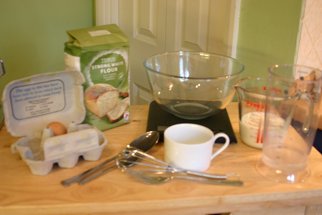This is something I’ve said a lot recently: “hang your maths on a real context and children will have more chance of being inspired to learn.” With that in mind here are three maths activities around making pancakes - in addition to the task of making the pancakes with all the measuring that involves.
Method
• measure the flour into the mixing bowl
• break both eggs into a cup (remove any bits of shell)
• add the egg into the middle of the flour
• use the fork and stir the eggs, gradually mixing in the flour around the edge until all the flour and eggs are evenly mixed.
• measure the milk in a jug
• add approximately 50ml of milk to the bowl and stir well
• continue adding 50ml of milk at a time and stirring until all the liquid is used and everything is completely mixed together, it will have the consistency of thin cream.
• measure the flour into the mixing bowl
• break both eggs into a cup (remove any bits of shell)
• add the egg into the middle of the flour
• use the fork and stir the eggs, gradually mixing in the flour around the edge until all the flour and eggs are evenly mixed.
• measure the milk in a jug
• add approximately 50ml of milk to the bowl and stir well
• continue adding 50ml of milk at a time and stirring until all the liquid is used and everything is completely mixed together, it will have the consistency of thin cream.
To cook
• get the frying pan hot, then turn down to a medium heat
• add a 1/2 teaspoon of the oil or butter
• put 2 tablespoons of the mixture into a jug, then pour into the frying pan
• cook until the top surface begins to harden (no wet patches) then toss and cook the other side. Each side should be partly brown.
• repeat until all the mixture has been used.
• get the frying pan hot, then turn down to a medium heat
• add a 1/2 teaspoon of the oil or butter
• put 2 tablespoons of the mixture into a jug, then pour into the frying pan
• cook until the top surface begins to harden (no wet patches) then toss and cook the other side. Each side should be partly brown.
• repeat until all the mixture has been used.
Look at the pancake recipe – it says use 2 eggs but are all eggs the same weight?
• what is the weight of the lightest egg? Heaviest egg? (Use eggs in shells for this)
• what is the mean, mode, median and range of all the eggs you weighed?
• how accurate is 50g as a standard weight for an egg? (Use eggs without shells)
Class organisation
Children weigh at least 6 eggs (swap eggs with other groups).
At the very end each group can break two eggs into separate cups and weigh the eggs without shells.
Children display their group results on egg-shaped display paper.
Measure the total amount of completed pancake mixture using the all ingredients in the recipe.
The recipe says that each pancake will be made with 2 tablespoons of mixture. Measure in millilitres the amount of mixture in 2 spoonfuls to the nearest 10ml.
Calculate how many pancakes can be made from your mixture. Now cook the pancakes and count how many you make.
How accurate was your calculation, why do you think there were more or fewer pancakes than you had predicted?
[Use the recipe above for these problems - it makes 300ml pf pancake mix which makes ten 30ml pancakes using 2 tablespoons of mix for each pancake]
1. A café needs recipes to make different quantities of pancakes.
Write a recipe to make:
30 pancakes
5 pancakes
45 pancakes
2. A chef buys 1kg bag of flour, 2 litres of milk and two packs of 10 eggs.
How many pancakes can be made using all these ingredients?
3. Write a formula that can be used to make any number of pancakes.
4. How much of each ingredient would be needed to make 5 pancakes each for 8 children?
1. A café needs recipes to make different quantities of pancakes.
Write a recipe to make:
30 pancakes
5 pancakes
45 pancakes
2. A chef buys 1kg bag of flour, 2 litres of milk and two packs of 10 eggs.
How many pancakes can be made using all these ingredients?
3. Write a formula that can be used to make any number of pancakes.
4. How much of each ingredient would be needed to make 5 pancakes each for 8 children?







